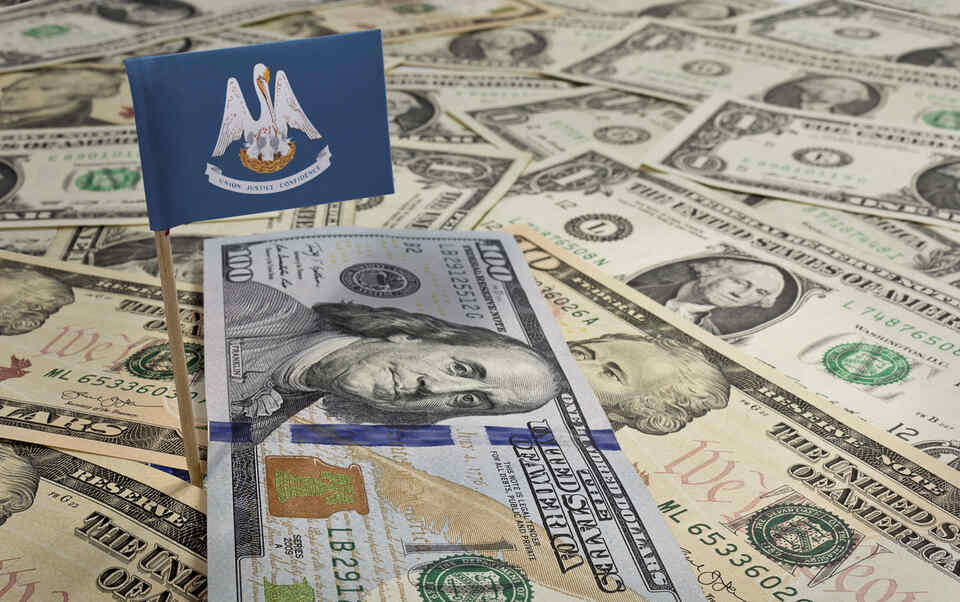The Taxman Has Entered the Chat
For months, regulators have argued about whether sweepstakes casinos like Chumba and WOW Vegas are really gambling. But Louisiana just cut through the noise with a new angle: forget gambling laws, let’s talk taxes.
On September 8, the state filed two lawsuits seeking a combined $44.4 million from Virtual Gaming Worlds (VGW), the company behind Chumba, LuckyLand, and Global Poker, and WOW Vegas (MW Services). The charge? Failing to collect and hand over state sales tax on the sale of virtual Gold Coins.
Turns out, the house doesn’t always win – sometimes it owes.
Breaking Down the Numbers
This isn’t just a slap on the wrist – it’s a full-on bill from the taxman.
According to court filings shared by gaming lawyer Daniel Wallach, Louisiana wants $44.4 million in back taxes, penalties, and interest:
- VGW, the operator behind Chumba Casino, LuckyLand Slots, and Global Poker, is facing the lion’s share at about $32.5 million.
- WOW Vegas, a smaller but still significant sweeps operator, has a tab of roughly $13.6 million.
Add it together and you’ve got a $44 million problem that’s growing by the day.
Louisiana’s pitch to the court is simple: when residents buy Gold Coins, they’re not just playing around with a digital goodie bag. They’re making a retail purchase—and retail purchases come with sales tax.
In other words, that flashy pack of 5,000 Gold Coins isn’t just a ticket to a few more spins. To the state, it’s no different from buying sneakers, a concert ticket, or a video game—and Louisiana wants its cut.
Timeline: How We Got Here
- June 2025 – The Crackdown Begins: The Louisiana Gaming Control Board fired off a volley of 42 cease-and-desist letters aimed at sweepstakes and offshore operators. VGW and WOW Vegas were right in the crosshairs, accused of running unlicensed gambling schemes in the state.
- July 11, 2025 – WOW Vegas Bows Out: Facing the heat, WOW Vegas announced its exit from Louisiana, giving local players a short redemption window before their Sweeps Coins turned into worthless pixels.
- July 10–11, 2025 – VGW Tweaks the Checkout: Almost in sync, VGW quietly began charging sales tax on Gold Coin purchases in states like Kentucky, Illinois, Arkansas, Pennsylvania, and Hawaii. For players, it looked like a small price hike. For regulators, it looked like VGW was bracing for a fight.
- September 8, 2025 – The Lawsuits Drop: Louisiana made its move, filing two lawsuits worth nearly $44 million against VGW and WOW Vegas. No more warnings, no more letters, this time, the taxman was coming to collect.
Why This Move Hits Different
Instead of asking “is this gambling?”, Louisiana is asking “did you pay your taxes?” And that’s a much easier question to enforce.
- For the state: Louisiana found a shortcut. Instead of slogging through endless debates about whether sweepstakes casinos count as gambling, it reframed the fight around something simpler: sales tax. No new laws needed, no drawn-out legislative battles, just a straightforward claim that Gold Coin purchases are taxable retail transactions.
- For other states: This strategy could spread fast. Tax enforcement is a universal tool, and every state wants revenue. If Louisiana pulls it off, other regulators may ditch the gambling-law debate and start sending their own tax bills to sweeps operators.
- For sweeps casinos: It’s potentially devastating. If Louisiana wins, it won’t just be about $44 million—it could open the door to hundreds of millions in back taxes nationwide. That’s a bill even the biggest operators can’t just shrug off.
Sweeps in the Crosshairs
The sweepstakes casino model has always walked a fine line. By running a dual-currency system—Gold Coins for casual play, Sweeps Coins for cash redemptions— operators could argue they weren’t offering “real” gambling. Add in a “no purchase necessary” disclaimer, and regulators often struggled to pin them down.
That clever design is exactly what let sites like Chumba and WOW Vegas thrive in the legal gray zone for so long. But Louisiana’s lawsuits expose the flaw: even if Sweeps Coins avoid direct gambling rules, the Gold Coin side of the business still creates taxable sales.
In short, the very system that sweeps casinos built to protect themselves has now become their biggest liability.
How VGW & WOW Vegas Are Playing Defense
VGW:
- Sales tax at checkout: Over the summer, VGW quietly began adding sales tax to Gold Coin purchases in states like Kentucky, Illinois, Arkansas, Pennsylvania, and Hawaii. For players, it looked like a small price hike; for regulators, it looked like a company trying to cover its bases before the hammer drops.
- California Terms of Service update: In California, VGW rewrote its ToS to tighten legal protections and head off potential lawsuits tied to AB 831, a bill that could further restrict sweeps-style gaming.
- Exit from Canada: In a bigger retreat, VGW announced it will fully withdraw from Canada by October 23, 2025, shutting down both Chumba Casino and Global Poker north of the border.
WOW Vegas:
- Louisiana exit: After receiving a cease-and-desist letter, WOW Vegas pulled out of Louisiana completely on July 11, 2025.
- Redemption deadline: Players were given only a short window to cash out their Sweeps Coins before the platform shut down access in the state.
It's clear these aren’t just housekeeping changes – they look like operators battening down the hatches for a storm.
🎮 What This Means If You’re a Player
- Louisiana residents: WOW Vegas is gone. If you missed the July redemption deadline, those coins are just pixels now.
- VGW players in taxed states: Expect to see sales tax added at checkout when buying Gold Coins—your packs just got pricier.
- Nationwide trend: More states may demand taxes on virtual coin sales. That means higher costs, more restrictions, or even exits like WOW’s Louisiana pullout.
🔮 What’s Next?
This is just the beginning. With two lawsuits already filed and 40+ cease-and-desist letters in circulation, more cases could follow.
Other states, especially New York, California, and Mississippi, are already circling sweepstakes casinos. Louisiana’s tax-based approach could become the new anti-sweeps playbook.
If Louisiana wins, it won’t just be about one $44M payday, it could trigger a domino effect that changes the sweeps model across the country.
Bottom line: Louisiana just found the weak spot in sweepstakes casinos—their wallets. Forget endless debates about “no purchase necessary.” The taxman has entered the game, and this time, the house might not win.

